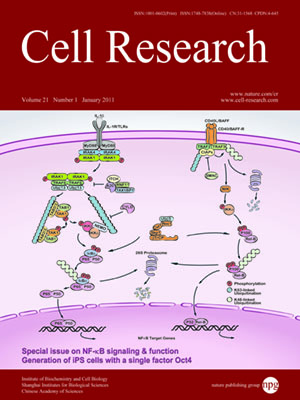
Volume 21, No 1, Jan 2011
ISSN: 1001-0602
EISSN: 1748-7838 2018
impact factor 17.848*
(Clarivate Analytics, 2019)
Volume 21 Issue 1, January 2011: 146-158
REVIEWS
NF-κB in the regulation of epithelial homeostasis and inflammation
Andy Wullaert*, Marion C Bonnet* and Manolis Pasparakis
Institute for Genetics, Centre for Molecular Medicine (CMMC), and Cologne Excellence Cluster on Cellular Stress Responses in Aging-Associated Diseases (CECAD), University of Cologne, Z黮picher Strasse 47a, 50674 Cologne, Germany
Correspondence: Manolis Pasparakis,(pasparakis@uni-koeln.de)
The IκB kinase/NF-κB signaling pathway has been implicated in the pathogenesis of several inflammatory diseases. Increased activation of NF-κB is often detected in both immune and non-immune cells in tissues affected by chronic inflammation, where it is believed to exert detrimental functions by inducing the expression of proinflammatory mediators that orchestrate and sustain the inflammatory response and cause tissue damage. Thus, increased NF-κB activation is considered an important pathogenic factor in many acute and chronic inflammatory disorders, raising hopes that NF-κB inhibitors could be effective for the treatment of inflammatory diseases. However, ample evidence has accumulated that NF-κB inhibition can also be harmful for the organism, and in some cases trigger the development of inflammation and disease. These findings suggested that NF-κB signaling has important functions for the maintenance of physiological immune homeostasis and for the prevention of inflammatory diseases in many tissues. This beneficial function of NF-κB has been predominantly observed in epithelial cells, indicating that NF-κB signaling has a particularly important role for the maintenance of immune homeostasis in epithelial tissues. It seems therefore that NF-κB displays two faces in chronic inflammation: on the one hand increased and sustained NF-κB activation induces inflammation and tissue damage, but on the other hand inhibition of NF-κB signaling can also disturb immune homeostasis, triggering inflammation and disease. Here, we discuss the mechanisms that control these apparently opposing functions of NF-κB signaling, focusing particularly on the role of NF-κB in the regulation of immune homeostasis and inflammation in the intestine and the skin.
Cell Research (2011) 21:146-158. doi:10.1038/cr.2010.175; published online 14 December 2010
FULL TEXT | PDF
Browse 2326


